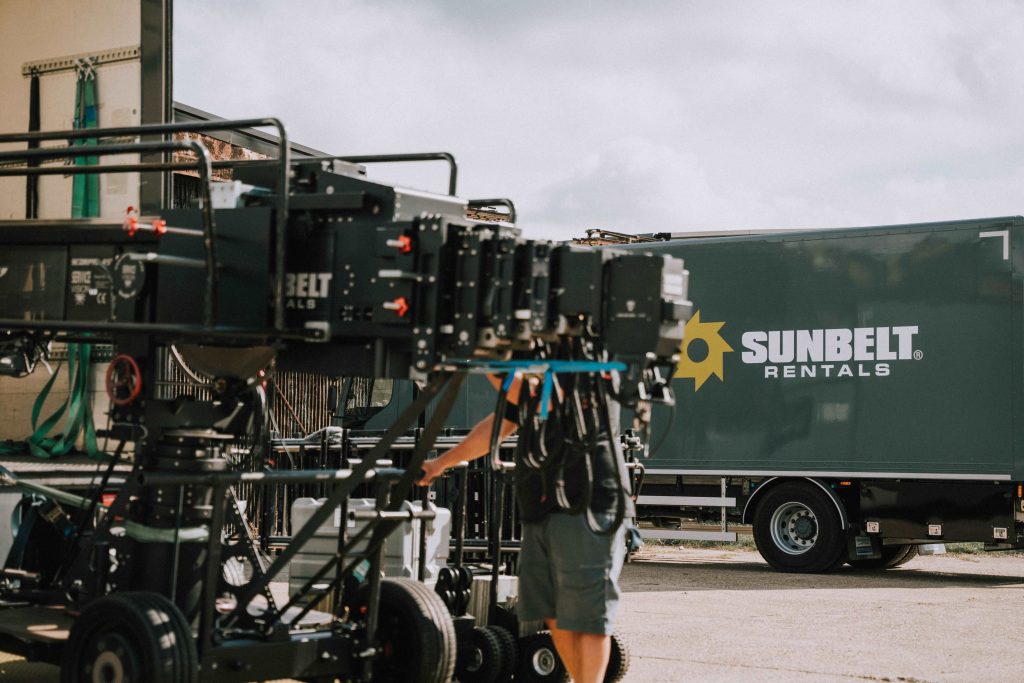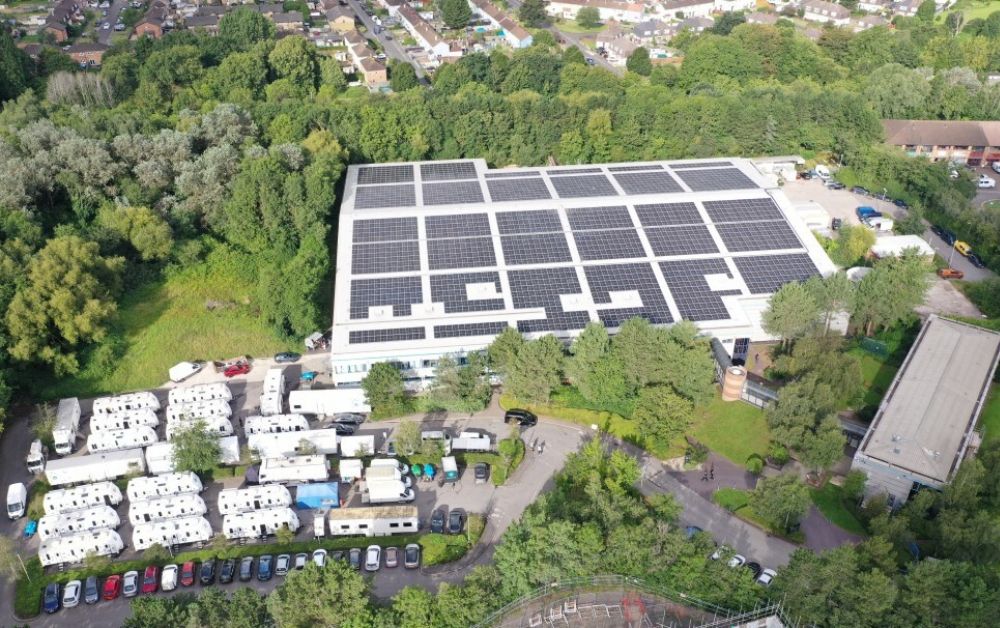December 1, 2023
As the Filming in England team roll out our new Suppliers Directory, we remain committed in our focus to support and promote sustainable and green practices. With climate scientists urging us to eliminate, and not just reduce our impact, it’s more important than ever we concentrate our efforts on renewable practices. With that in mind, we are reflecting on the measures our industry has taken to protect our futures. As an industry, we must continue to strive to improve and develop standards towards a better future for everyone, helping to protect the planet – not only for ourselves, but future generations. The UK film industry has pledged to achieve net-zero carbon emissions by 2050, and many productions are actively working to reduce their carbon footprint by using energy-efficient equipment and renewable energy sources. However, there is minimal regulation at present, and the industry is left largely to its own devices. Given the need to meet the UK’s legal obligations, this will need to change soon.
Filming in England recently attended the launch of Albert’s Screen New Deal Report. A major resource for the industry when setting out plans for a more sustainable future, the report outlines key recommendations to address energy use and waste in the industry, identifying the areas of change, barriers to the change, and the route to net zero. Steve Smith, Albert’s project lead on Screen New Deal commented:
“Climate change is impacting our world in immediate and sustained ways, and the film and TV industries have a key role to play in showing the ways to address it. The Screen New Deal Transformation Plan for Wales has drawn on research and practice to provide a landmark route to a sustainable future in production. It sets out a practical approach to reducing carbon footprints and waste. It’s a very exciting step for Wales to be the first area to adopt these recommendations, and albert is committed to working with stakeholders on the ground to support content-creators in taking them forward. We all need to work together, and at pace, to encourage, implement and fund real progress which can be used as a blueprint for the whole of the UK. It’s encouraging to see Filming in England being proactive in this critical space.”
The full report can be accessed here.
Our new directory is funded through BFI National Lottery support, which has established environmental sustainability as a core principle across its 10-year plans as set out in Screen Culture 2033. In addition to funding research like the Screen New Deal Transformation Plan, the BFI is committed to supporting its awardees and wider industry to work more sustainably. The BFI National Lottery Sustainable Screen programme will provide training, tools, resources, and guidance through a partnership with Julie’s Bicycle and BAFTA albert to deliver a green transition across the screen industries. BFI’s Head of Environmental Sustainability, Keir Powell-Lewis, said:
“The BFI has been working on a sustainability across its funding portfolio, cultural programming, and role as the lead body for film and the moving image. Since publishing our first major report on sustainability in screen production in 2020, we have stepped this up by providing dedicated funding and support for the sector in our new 10-year Screen Culture and BFI National Lottery strategies. We’ve been talking to friends and partners across the screen industries working collaboratively to deliver step-change in how our sector operates. We know there is more to do, and we encourage organisations to talk to us about how we can help. We know from the Screen New Deal Transformation Plan that travel and transport is the single biggest portion of a production’s carbon footprint. That’s why we’re proud to fund resources such as the Filming in England directory to help productions find exceptional local suppliers to support a thriving sector.”
Collaboration on this topic is incredibly important, as we strive to create best practice, we also need to ensure that all production is on track to achieve its sustainable goals. We spoke to some of our members of the Filming in England Partnership who make sustainability a focus across their activity to share their learnings and best practice.

At the heart of these sustainability efforts are the green practices that have been developed within the production sphere. Some large-scale productions, for instance, have begun to employ Sustainability Coordinators – a significant course of action. Far from merely declaring what ‘rubbish’ goes in the recycling bin, the Coordinator’s central purpose is to support production in employing eco-friendly materials, decrease energy consumption and drastically minimise impact. In truth, the role – and the wider department to which it belongs – is still in its infancy, and as such warrants further development as it becomes ever more prevalent and important within the industry. Reinforcing the importance of a Sustainable department, Bristol’s famous Bottle Yard Studios have informed us of their long-term “ambitions to seek funding” to employ a sustainability lead for the business. That both productions and studio spaces are prioritising this role suggests a unified sector; one on its way to achieving its green ambitions.
Travel, of course, remains a salient issue, and continues to impede industry’s environmental and sustainable efforts. Convoying talent, crew and equipment to and from set and various locations often requires travelling great distances. And collectively, the industry is looking towards carpooling as a more viable and long-term solution. Similarly, there is building momentum from ongoing studio discussions surrounding shuttle bus services to escort cast and crew to and from the studio lots – an excellent solution to help productions further drive down their emissions.
Whilst attending a seminar for sustainable studios by albert, it was evident that the studios who attended had an appetite for repurposing materials and donating others where appropriate. One such company that recently joined the Filming in England Partnership and is championing this process is CAMA Asset Store. Their Head of Engagement and Partnership Development, Ella Neville, stated,
“At CAMA we are incredibly proud to be supporting the film and television industry throughout England and beyond with its asset management. Alongside our AssetStore storage solutions, our software AssetFlow, is enabling productions to gain full traceability and visibility over their props, sets, and costumes. After digitally cataloguing their assets, production teams can find exactly what they need, when they need it, with the click of a button.
This also powers our industry-first AssetCycle sustainability service. With AssetCycle, we are facilitating a more circular economy and providing carbon data on the impact of reuse when storage is no longer required. With our extensive network of industry professionals (including other productions, prop houses, and costumiers) and not-for-profit partners (including charities, schools, and community groups) we are ensuring that assets find a good second home. Our life cycle analysis system then evidences the carbon emissions avoided through reuse versus landfill, providing productions and studios with valuable data that they need for reporting.
Whether it’s asset management on set, storage after wrapping, or coordinating reuse after a strike, we’re excited to be sharing more about our innovative services through the Filming in England Partnership!”
Currently, there is more of a need for this practice as there is greater potential for the ability to reuse materials, but it is important to note that there is some hesitancy surrounding repurposing props from productions, due to the copyright worries and intellectual property that may be able to be reused. This can be combatted however, through changing the props in question into something totally unrecognisable from the initial product. This process helps guarantee their longevity, and ensures waste is significantly reduced. Alongside this, the publicity could be great for any production that would be willing to donate any materials not used to local communities, once again greatly reducing waste, whilst at the same time benefiting the communities that may need further help. However, if productions are not comfortable doing this, at least using biodegradable or eco-friendly options for the materials for said props would be more beneficial in reaching higher levels of sustainability.

Another way productions can focus on becoming more sustainable is through the equipment that they are using, from energy efficient lighting to clean energy products. As such they can further relationships with eco-friendly rental companies such as Sunbelt Rentals, another recent member of the Filming In England Partnership. Mick Ledden, Managing Director of Energy Solutions, Sunbelt Rentals said:
“At Sunbelt Rentals we are on a mission to drive down carbon emissions. With over £130million invested by Sunbelt into solutions proven to lower emissions, no other UK based equipment rental provider has invested more in greener technologies over the past 3 years. This has given our customers access to the largest range of ultra-low carbon solutions on the market, all backed by an unrivalled commitment to invest in new technologies such as wind, solar and hydrogen as and when a commercially viable solution is brought to market. Right now we’re working with a range of Film and TV customers to understand and integrate sustainable solutions that are tailored to their specific needs and projects, ensuring uninterrupted power, when and where they need it, whilst working to meet their sustainability goals.
We pride ourselves on providing high-quality, sustainable solutions to support productions of all sizes throughout the UK, whether that be in studio or on location. Our long-standing relationships with key manufacturers are essential to developing our product portfolio, and as such were pleased to able to offer the very latest LED lighting, electric grip and clean energy products to our customers.”

(Image of The Bottle Yard Studios new array)
A growing number of studios have been implementing similar protocol and revamping their day-to-day operations, from the development of green spaces, to aiming to promote biofuels over diesel generators, amongst others things. They have been implementing procedures, such as single use plastic bans, and adding roof solar panels. Ways that are being discussed to help improve studios’ sustainability are numerous and include such things as re-wilding and encouraging biodiversity in their outside spaces, use of vertical space to increase levels of greenery, whilst at the same time aiming for polystyrene bans and ensuring catering is sustainable to minimise waste. Other ways studios can improve their environmental impact is through stage isolation, at the end of each day there is a stage lockdown, ensuring all power is off to ensure a reduction in energy consumption.
Alongside having a focus on their long term ambition to acquire a sustainability lead, Bottle Yard Studios also has a dedicated Green Team that is delivering a rolling programme of sustainable improvements; from replacing existing lights with LED, to implementing a bespoke waste management and reuse strategy, installing on-site EV and electric bike charging points. They also are developing a sustainability toolkit open resource that promotes circular economy and environmentally focused decision making by visiting productions, and ensuring both sites are on 100% renewable electricity tariffs.
However, the biggest sustainability project The Bottle Yard has achieved to date is without a doubt the gigantic 1MWp solar rooftop array, funded by Bristol Energy Cooperative, which powers its new expansion facility TBY2 which opened last year. “With more than 2,300 PV panels, it’s believed to be the largest community-owned rooftop solar array in the UK, and the largest rooftop PV installation on any UK film/TV studio,” says Katherine Nash, Business Operations Manager and Sustainability Lead at The Bottle Yard Studios. “The TBY2 building itself was also designed with a sophisticated building management system to ensure maximum energy efficiency through heating, cooling and ventilation.”
In March of this year, The Bottle Yard’s TBY2 facility was one the first of its kind to receive the new global Studio Sustainability Standard from BAFTA albert and Arup. “The beauty of a solar project like this is how measurable the effects are,” says Nash. “We have access to a live tracker that tells us how much energy the array is producing at any one time. As well as the tangible benefits, this project is enabling The Bottle Yard to raise awareness of the importance of studio sustainability and demonstrate an innovative solution to reducing studio carbon emissions.”

Another studio currently focused on sustainability is the Vectar Project. Tom Henderson, the Managing Director of the Vector Project had the following to say during our conversation with the studio:
“VECTAR was created with sustainability as a central pilar of the studio – proactively finding ways to reduce our impact and help the planet. Low energy film lighting powered by solar in 2020, Virtual production in 2021 and for over 2 years developing VECTAR Sets that is up to 90% lower carbon and 100% recyclable. Sustainability and zero impact filming is not a choice it is a commitment we all have to make. As we have always said… “we can only change the world.. if first we change our own world, sustainably.”
Something that should be considered by studios is to focus more on suppliers that would help meet their aims. To help studios and productions alike find eco-friendly companies, Filming In England’s re-launched Suppliers Directory provides industry with options to narrow fields to only include companies with either an environmental policy or green credentials. This ensures that productions searching the directory receive only the most relevant and sustainable friendly options, helping them towards their sustainability goals. In addition, we encourage productions to contact our Crewing Team to assist them in finding suppliers that can help them achieve their environmental goals, whilst ensuring that these services are local to the England’s regions, operating beyond the bounds of London. Working with our local partners, we are proudly advocating for sustainable working practices and the transition towards a net-zero future, and resultantly, have produced a Sustainability Toolkit designed to help productions of all budgets, sizes and genres drive down their CO2 emissions, more information can be found by visiting our Sustainable Production Practices page.
The industry is on the right path towards a better cleaner future. However, there are still plenty of areas that we can improve and strive towards, from car shares to repurposing materials. There are many small and large changes that we can continue to make as an industry to help achieve our aims of a carbon neutral economy. It is incredibly important that we as an industry work together towards a better future, as only if we work together, can we see meaningful impact and results.
To find out more about Filming In England and the services offered please follow this link
If you would like to hear more about CAMA they will be attending FOCUS 2023: https://focus.london/
To find out more about how Sunbelt Rentals can help reduce your carbon footprint and reduce the environmental impact of film and TV making, contact them here.
To find out more about The Bottle Yard Studios please follow this link
To find out more about the Vectar project please follow this link
To find out more about the Bafta-albert please follow this link
To find out more about the BFI please follow this link



